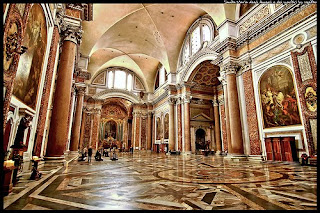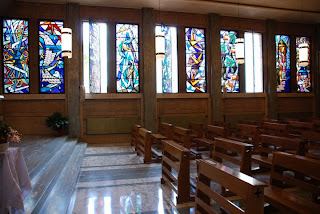
Connected with and belonging to the monastery of Tre fontana are three separate churches. The first, the Church of St. Paul of Three Fountains, was raised over the spot where St. Paul was beheaded by order of Emperor Nero. Legend says that the head, once severed from the body, bounced, striking the earth in three different places from which fountains sprang up, which flow to the present day and are located within the sanctuary itself.
The second, originally dedicated to the Blessed Virgin Mary under the title "Our Lady of Martyrs", is built over the relics of Saint Zeno and his 10,203 legionaries, who were martyred here at the order of Diocletian in 299. In this church is the altar "Scala Coeli" ("ladder to heaven"), from which the church receives its present name. Finally there are the church and monastery dedicated to Saints Vincent and Anastasius, built by Pope Honorius I in 626 and given to the Benedictines, who were to care for the two older sanctuaries, as well as their own church.
Towards the middle of the seventh century the persecutions inflicted on the Eastern monks by the Monothelites obliged many of them to seek shelter in Rome, and this abbey was committed to them as a refuge.
The abbey was richly endowed, particularly by Charlemagne, who bestowed on it Orbetello and eleven other towns with a considerable territory, over which its abbot exercises ordinary jurisdiction (abbatia nullius).
In the tenth century it was given to the Cluniacs. In 1140 Pope Innocent II withdrew the abbey from them, and entrusted it to St. Bernard, who sent there a Cistercian colony from Clairvaux, with Peter Bernard of Paganelli as their abbot, who five years later became Pope Eugene III.
At the time Innocent granted the monastery to the Cistercians, he had the church repaired and the monastic quarters rebuilt according to the usages of the order. Of the fourteen regular abbots who actually governed the abbey, several besides Blessed Eugene III became cardinals, legates, or bishops. Pope Honorius III again restored the Church of Saints Vincent and Anastasius and personally consecrated it in 1221, seven cardinals at the same time consecrating the seven altars therein.
Cardinal Branda da Castiglione became the first commendatory abbot in 1419, and after him this office was often filled by a cardinal. Future popes Clement VII and Clement VIII as cardinals held this position. Pope Leo X authorized the religious in 1519 to elect their own regular superior, a claustral prior independent of the commendatory abbot, who from this time forward was always to be a cardinal. From 1625, when the abbey was affiliated to the Cistercian Congregation of St. Bernard in Tuscany, until its suppression at the Napoleonic invasion in 1812, the local superior was a regular abbot, but without prejudice to the commendatory abbot. The best known of this series of regular abbots was the second, Dom Ferdinand Ughelli, who was one of the foremost literary men of his age, the author of "Italia Sacra" and numerous other works.
From 1812 the sanctuaries were deserted, until Leo XII removed them from the nominal care of the Cistercians in 1826, and transferred them to the Friars Minor of the Strict Observance. The purpose of the pontiff was however not accomplished: the surroundings were so unhealthy that no community could live there.
In 1867 Pius IX appointed as commendatory abbot of Tre Fontane his cousin Cardinal Milesi-Ferretti, who endeavored to restore the material desolation that reigned in the neglected sanctuaries. To this end he obtained that their care be again committed to the Cistercians. A community was sent there in 1868 from La Grande Trappe to institute the regular life and to try to improve the healthiness the lands, which from long neglect had been called the tomba (graveyard) of the Roman Campagna.
When the Papal States were inglobated in the Italian kingdom in 1870, the friars remained at Tre Fontane, at first renting and later (1886) definitively purchasing it from the Government, with an additional tract of 1,234 acres. They inaugurated modern methods for the elimination of the malarial conditions that had been such an obstacle to health in the past, especially by planting a large number of eucalyptus and other trees, an experiment insisted upon by the government in the contract of sale. The trial proved a success, so that the vicinity became nearly as healthful as Rome itself.
The second, originally dedicated to the Blessed Virgin Mary under the title "Our Lady of Martyrs", is built over the relics of Saint Zeno and his 10,203 legionaries, who were martyred here at the order of Diocletian in 299. In this church is the altar "Scala Coeli" ("ladder to heaven"), from which the church receives its present name. Finally there are the church and monastery dedicated to Saints Vincent and Anastasius, built by Pope Honorius I in 626 and given to the Benedictines, who were to care for the two older sanctuaries, as well as their own church.
Towards the middle of the seventh century the persecutions inflicted on the Eastern monks by the Monothelites obliged many of them to seek shelter in Rome, and this abbey was committed to them as a refuge.
The abbey was richly endowed, particularly by Charlemagne, who bestowed on it Orbetello and eleven other towns with a considerable territory, over which its abbot exercises ordinary jurisdiction (abbatia nullius).
In the tenth century it was given to the Cluniacs. In 1140 Pope Innocent II withdrew the abbey from them, and entrusted it to St. Bernard, who sent there a Cistercian colony from Clairvaux, with Peter Bernard of Paganelli as their abbot, who five years later became Pope Eugene III.
At the time Innocent granted the monastery to the Cistercians, he had the church repaired and the monastic quarters rebuilt according to the usages of the order. Of the fourteen regular abbots who actually governed the abbey, several besides Blessed Eugene III became cardinals, legates, or bishops. Pope Honorius III again restored the Church of Saints Vincent and Anastasius and personally consecrated it in 1221, seven cardinals at the same time consecrating the seven altars therein.
Cardinal Branda da Castiglione became the first commendatory abbot in 1419, and after him this office was often filled by a cardinal. Future popes Clement VII and Clement VIII as cardinals held this position. Pope Leo X authorized the religious in 1519 to elect their own regular superior, a claustral prior independent of the commendatory abbot, who from this time forward was always to be a cardinal. From 1625, when the abbey was affiliated to the Cistercian Congregation of St. Bernard in Tuscany, until its suppression at the Napoleonic invasion in 1812, the local superior was a regular abbot, but without prejudice to the commendatory abbot. The best known of this series of regular abbots was the second, Dom Ferdinand Ughelli, who was one of the foremost literary men of his age, the author of "Italia Sacra" and numerous other works.
From 1812 the sanctuaries were deserted, until Leo XII removed them from the nominal care of the Cistercians in 1826, and transferred them to the Friars Minor of the Strict Observance. The purpose of the pontiff was however not accomplished: the surroundings were so unhealthy that no community could live there.
In 1867 Pius IX appointed as commendatory abbot of Tre Fontane his cousin Cardinal Milesi-Ferretti, who endeavored to restore the material desolation that reigned in the neglected sanctuaries. To this end he obtained that their care be again committed to the Cistercians. A community was sent there in 1868 from La Grande Trappe to institute the regular life and to try to improve the healthiness the lands, which from long neglect had been called the tomba (graveyard) of the Roman Campagna.
When the Papal States were inglobated in the Italian kingdom in 1870, the friars remained at Tre Fontane, at first renting and later (1886) definitively purchasing it from the Government, with an additional tract of 1,234 acres. They inaugurated modern methods for the elimination of the malarial conditions that had been such an obstacle to health in the past, especially by planting a large number of eucalyptus and other trees, an experiment insisted upon by the government in the contract of sale. The trial proved a success, so that the vicinity became nearly as healthful as Rome itself.









































